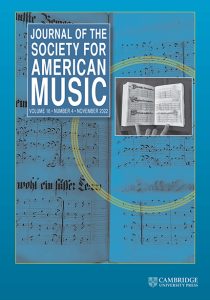Author: Anabel Maler
Publication details: Journal of the Society for American Music, Volume 16 , Issue 2 , May 2022 , pp. 184 – 205
Weblink: cambridge.org

Abstract: This article argues that deaf musical knowledge became epistemically excluded from systems of musical thought in the United States as the result of a battle between two competing philosophies of deaf education in the nineteenth century: manualism and oralism. It reveals how oralist educators explicitly framed music as exclusively involving “normal hearing”—and thus as outside of deaf knowledge except through technological intervention—by drawing on ideas about eugenics, race, and authenticity. Ideas about morality and technology also colored views of deaf musicality in the United States, shaping the reception of deaf music-making throughout the twentieth century until today. This article tells the story of how deaf music-making came to be forgotten and discovered, again and again, in the U.S. consciousness. By way of conclusion, I suggest that in order to address the epistemic exclusion of deaf musical knowers, we must carefully attend to what deaf epistemologies bring to music studies.